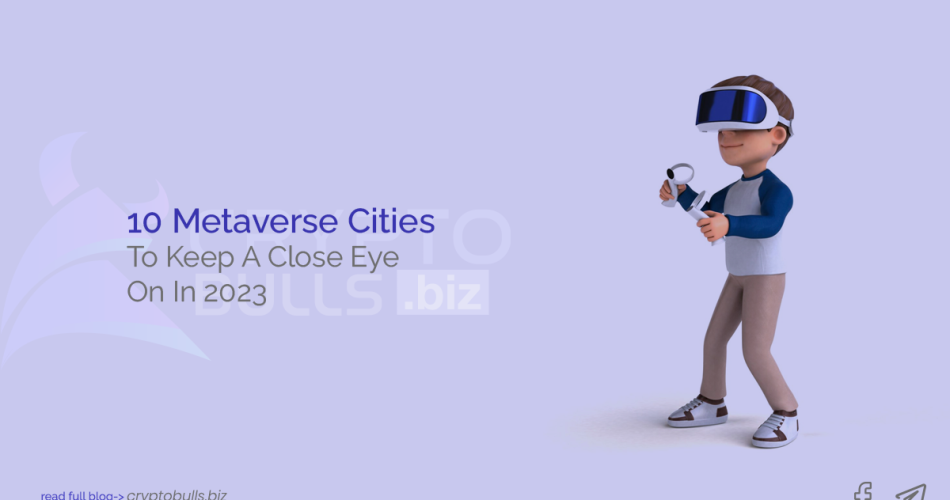10 Metaverse Cities To Keep A Close Eye On In 2023
The metaverse concept is currently gaining traction in 2023, with many virtual cities and hubs emerging as significant participants in this fast evolving digital ecosystem. Here are ten metaverse cities to watch this year:
1. Shanghai
Shanghai, one of the world’s most technologically advanced cities, is at the forefront of the Metaverse development. The city is actively working on creating a digital twin that will serve various purposes, from urban planning to public administration and tourism. Following China’s embrace of the Metaverse concept, Shanghai issued comprehensive development plans, focusing on integrating this technology into multiple aspects of daily life. These plans aim to encourage the application of the metaverse in public services, business operations, entertainment, manufacturing, safety, and gaming. The metaverse has become a significant part of China’s technological future, as it aligns with the central government’s vision for the next generation of the internet.

2. Dubai
Dubai, known for its forward-thinking approach, is heavily investing in the Metaverse. The city is undertaking the development of a Metaverse metro network to connect its various districts. Notably, Dubai is also home to the Virtual Asset Regulatory Authority (VARA), the world’s first regulatory body for virtual assets.

The broader Middle East, including the United Arab Emirates, is emerging as a hub for Metaverse innovations. Sharjah, a neighboring emirate, is following in Dubai’s footsteps by exploring Metaverse projects, such as the “Sharjah Verse,” a virtual city aimed at boosting tourism and economic activities. The UAE’s forward-looking approach extends to blockchain and crypto adoption, with plans to introduce crypto licensing legislation, potentially positioning the country as a hub for digital asset businesses.
3. Santa Monica
Santa Monica, a city in California known for its picturesque beaches and tech industry, is actively developing a Metaverse city app. This app will enable users to immerse themselves in a virtual Santa Monica, participating in various activities such as shopping, dining, and attending events. FlickPlay, a prominent app in Santa Monica, recently partnered with the city to provide its residents with access to the Metaverse through the app.

FlickPlay combines interactive maps with token collection, gamifying the experience and potentially boosting local businesses. This innovative approach enhances the connection between physical and digital spaces and shows promise for engaging the local community.
4. Tokyo
Tokyo, the vibrant capital of Japan and a global tourist destination, is embracing the Metaverse by developing a digital twin of the city. This virtual representation aims to promote tourism and attract businesses. Tokyo is already home to several Metaverse-related projects, such as the Metaverse Japan Consortium.

Among the notable developments in Tokyo is the “Virtual Market 2021,” which has been recognized by the Guinness World Records for hosting the “Most Booths at a Virtual Reality Market Event.” Tokyo’s embrace of the Metaverse aligns with a global trend where the concept of a virtual world is becoming increasingly intertwined with real-world applications.
5. New York City
New York City, one of the world’s largest and most influential cities, is actively working on developing a digital twin of itself. This digital replica will serve various purposes, including urban planning, public administration, and tourism.

New York City is also the home of several Metaverse-related projects, such as the Metaverse New York Consortium. The city’s commitment to the Metaverse coincides with a global wave of interest in creating digital counterparts for real-world cities. The Metaverse offers a novel approach to city management, fostering innovation in urban planning and administration.
6. London
London, the capital of the United Kingdom, a global financial center, and a cultural hub, is embracing the Metaverse. The city is in the process of developing a digital twin that will find applications in urban planning, public administration, and tourism. London is also home to various Metaverse-related projects, including the Metaverse London Consortium.

As part of this, Nextech AR Solutions has created a “mini-Metaverse” at “Harmony at London Wall Place,” demonstrating the potential of Augmented Reality (AR) in transforming unused city spaces and positively impacting local economies. This initiative underscores the convergence of digital and physical worlds and hints at the transformative potential of the Metaverse in modern urban environments.
7. Singapore
Singapore, a forward-thinking city-state in Southeast Asia, is pioneering the development of the first digital twin of an entire country. Singapore is home to various Metaverse-related projects, such as the Metaverse Singapore Consortium, which aims to drive Metaverse development within the city-state.

Affyn, a Singapore-based company, is contributing to the Metaverse growth by developing a metaverse city named “Mega City,” attracting partners from various sectors, including film, music, entertainment, finance, and real estate. This unique partnership aims to create a virtual cultural hub, blurring the lines between the digital and physical realms and serving as a groundbreaking example of Metaverse adoption.
8. Seoul
Seoul, the capital of South Korea and a technological powerhouse, has embarked on creating a full Metaverse city, offering residents the opportunity to live, work, and play in a virtual world. The city’s Metaverse efforts align with a broader trend in South Korea, where authorities are heavily investing in Metaverse technologies.

Seoul’s Metaverse project initiates by improving public services through the virtual platform, offering services like issuing proof of citizenship, tax counseling, youth mentoring, and support for local businesses. This initiative reflects South Korea’s strategic priority of advancing the Metaverse, recognizing its potential to transform how people interact and create value in both the digital and physical worlds.
9. Decentraland
Decentraland is a decentralized Metaverse platform built on the Ethereum blockchain, allowing users to create, own, and trade virtual land. The platform features multiple avenues to obtain the native cryptocurrency, MANA, which is essential for purchasing virtual real estate. Users can engage in play-to-earn games, explore casinos, and complete quests to acquire MANA. Alternatively, individuals can offer their services for MANA or create assets to sell in Decentraland’s marketplace.

Once users acquire MANA, they can invest in virtual LAND parcels, aiming to capitalize on the potential value growth as more users join the platform. Decentraland offers various possibilities for creativity and profit within its digital world.
10. The Sandbox
The Sandbox, another decentralized Metaverse platform built on the Ethereum blockchain, presents a thriving ecosystem for users to create, own, and trade virtual land and collectibles. To enhance cultural experiences within the virtual world, The Sandbox has attracted partners from diverse sectors, such as film, music, entertainment, and finance, who have acquired LAND NFTs and committed to building experiences in Mega City.

For those interested in securing prime locations in Mega City, The Sandbox is launching a new LAND sale. The potential value of these LAND parcels is tied to their location and the activities created in collaboration with the newly announced partners. This initiative underscores the collaborative and creative potential of the Metaverse.
Conclusion:
The Metaverse, a convergence of physical and digital worlds, is rapidly reshaping urban landscapes worldwide. From the high-tech metropolises of Shanghai and Dubai to the more culturally-oriented cities like Santa Monica and Tokyo, the Metaverse is leaving its mark on how we interact, engage with our surroundings, and even transact in these urban environments. Notably, New York, London, Singapore, and Seoul are developing digital twins to enhance urban planning, governance, and tourism. This transformation aligns with a broader global trend where the Metaverse is becoming a multifaceted tool for creating, experiencing, and enhancing the cities we inhabit.
In this dynamic landscape, decentralized Metaverse platforms like Decentraland and The Sandbox offer creative and economic opportunities for users. By owning virtual real estate, users can participate in the growth of these digital realms, and they are no longer mere consumers but active contributors to the Metaverse’s development. With emerging projects like Decentraland’s virtual cultural hub and The Sandbox’s Mega City, the Metaverse is not only reshaping physical cities but also creating entirely new ones, blending culture, entertainment, and commerce within a digital space.
As the Metaverse continues to evolve, it’s crucial to address common questions about this emerging technology. Some commonly asked questions (FAQs) are as follows:
Frequently Asked Questions (FAQ’s)
- What exactly is the Metaverse?
The Metaverse is a collective virtual shared space that merges aspects of physical and digital reality. It encompasses augmented reality (AR), virtual reality (VR), and the internet, allowing users to interact with each other and digital environments.
- Why are cities investing in the Metaverse?
Cities are investing in the Metaverse to improve urban planning, enhance governance, boost tourism, and drive economic growth. They see the Metaverse as a tool to create digital twins of their urban environments, offering new possibilities and experiences to residents and visitors.
- What are digital twins?
Digital twins are virtual replicas of physical objects, systems, or cities. In the context of the Metaverse, they refer to virtual representations of real-world cities or environments.
- What are decentralized Metaverse platforms like Decentraland and The Sandbox?
These platforms allow users to create, own, and trade virtual land and assets within a digital world. Users can participate in a decentralized economy and earn through various activities, such as gaming, creative content creation, and virtual commerce.
- How do I get involved in decentralized Metaverse platforms?
To participate in platforms like Decentraland and The Sandbox, you can start by acquiring the native cryptocurrency (e.g., MANA for Decentraland). With MANA, you can invest in virtual land parcels or engage in activities and trade assets within these platforms.
- What is the potential value of virtual real estate in the Metaverse?
The value of virtual real estate in the Metaverse depends on factors like location, user engagement, and activities in the virtual world. Prime locations and creative developments can potentially appreciate in value over time.
- How can businesses benefit from the Metaverse?
Businesses can leverage the Metaverse for marketing, customer engagement, and immersive experiences. They can create virtual storefronts, offer unique services, and reach a global audience through Metaverse platforms.
- What challenges does the Metaverse face?
Challenges include privacy concerns, digital property rights, and ensuring equitable access. Interoperability and technical standards are also important for seamless experiences in the Metaverse.
- What’s the future of the Metaverse?
The future of the Metaverse is expected to include more realistic and immersive experiences, with broader adoption across various industries, including education, entertainment, healthcare, and more. It will continue to evolve and shape the way we interact with the digital and physical worlds.
- Is the Metaverse secure?
Security is a concern, and developers are working on solutions to protect users and their digital assets in the Metaverse. Decentralized technologies like blockchain offer potential solutions for securing digital property and transactions.
As the Metaverse continues to unfold, it holds the promise of transforming not only our cities but also our digital experiences and how we connect with the world around us. It’s an exciting frontier with boundless opportunities for individuals, businesses, and urban environments.


